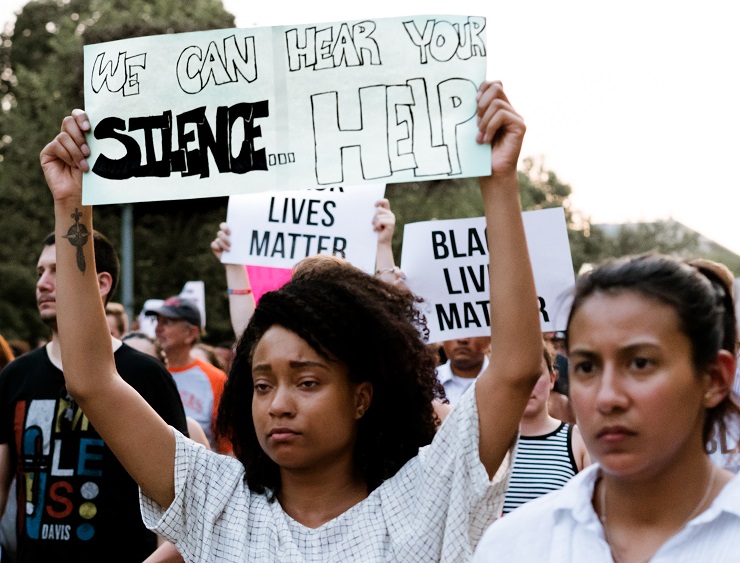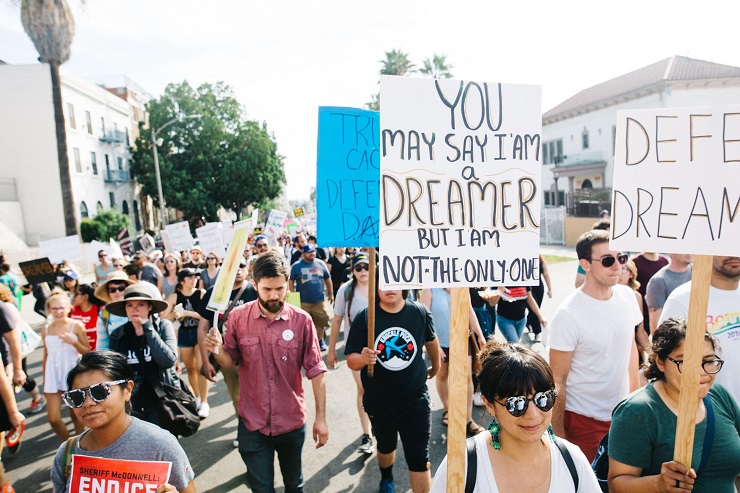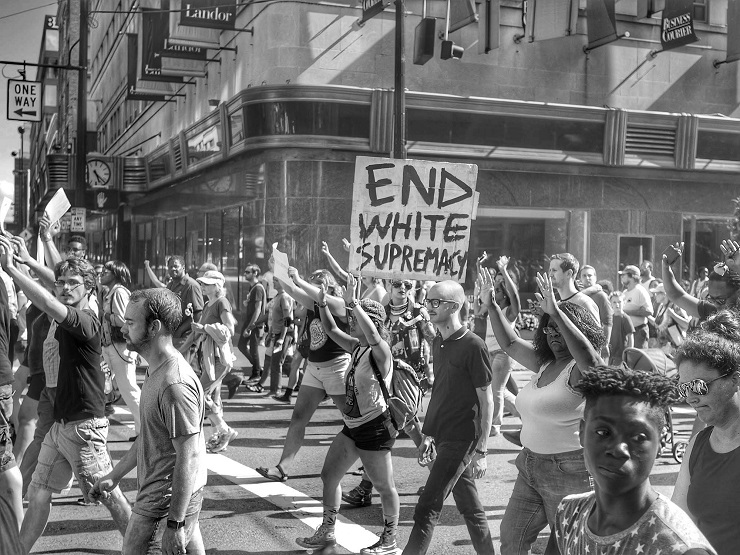
We can hear your silence Victoria Pickering / Victoria Pickering via Flickr CC License
Chris Crass is a longtime organizer, educator, and writer working to build powerful working class-based, feminist, multiracial movements for collective liberation. He is a one of the leading voices in the country calling for and supporting white people to work for racial justice. He joined with white anti-racist leaders around the country to help launch the national anti-racist network Showing Up for Racial Justice (SURJ), which works in white communities for racial justice. Rooted in his Unitarian Universalist faith he works with congregations, seminaries, and religious and spiritual leaders to build up the Religious Left. He lives in Louisville, KY with his partner, and their two kids. Learn more about Chris here. I spoke with Chris and Richie Schulz, Philadelphia Yearly Meeting’s community engagement fellow, on September 6th, we talked about the current political moment, organizing white folks for racial justice, and the stake white people have in that work. This is the second of five posts from that conversation. This wasn’t an interview per se, but a conversation with each of us contributing.
Lucy Duncan: I think there’s this real precarity at the same time there are many openings to work for change. AFSC helped to organize 3,000 people walking out of the schools in Denver after the announcement regarding DACA (Deferred Action of Childhood Arrivals). There is this immediate and enormous response from veteran activists and some people who have never protested before.
At the same time, there is real brutality being enacted in response to the protests. I think it makes it all that more important that we are courageous and operate as a courageous many in the face of that. I’m interested in the danger that you perceive, too. There has been so much incredible work going on for a long time creating the movements that are showing up on the ground now. It also feels as though the precarity is very, very real.

Chris Crass: Yeah, absolutely. I think it’s an incredibly dangerous time, whether it’s vigilantly racist violence being actively encouraged by the presidency, the GOP agenda, and Democratic complicity as well. Whether it’s the institutional attacks that are taking away resources from so many of our communities. Whether it’s the tweets of the president that are demonizing different groups of people each week because there’s another whole part of our society that’s under attack from the president. We are in incredibly dangerous times, and every time I hear about leaders from the Dreamers Movement speak and say, “here to stay, undocumented and unafraid!”, that kind of leadership and that kind of example amidst such incredible danger is really inspiring. Literally, black women leaders who are having to cancel speaking engagements or hiring security because of threats of violence. to be able to go and participate in public functions and speak on panels. That has a real impact on the psyche of our movement.
I think there is a danger in this kind of violence where we start to operate in more non-public ways, and we almost start to go underground or become more secretive. But I think that even though the Black Lives Matter Movement and leaders in Black Lives Matter receive so many death threats, receive so much racist, misogynistic, hateful trolling on the internet, and also on Fox News, they nonetheless continue to be incredibly public, bringing their leadership to wider and wider audiences. A and I think that’s what is critical in this time. We should be trying to figure out ways we can support each other to be more and more visible, more and more publicly out there and engaging a wider range of people.

I think a major shift that has taken place since the election is that more and more grassroots left leaders need to run for office and win, that we can’t rely on liberal national leadership to advance a progressive agenda or defeat the racist right, that we need progressive candidates to advance an economic, racial, gender justice agenda and a vision that can mobilize the majority, a politics that is a real alternative to pro-corporate power, pro-capitalist democratic politics, but is also clear about the dangers of right-wing fascism.
Lucy Duncan: I think that all of that is really true in addition to the narrative change work that progressives focus on a lot. We also have to be willing to do the messy work of getting involved in electoral politics and be willing to understand that that’s a really important place to build power. When the Fugitive Slave Act was enacted, what that did for abolitionists is it really radicalized everyone. There was a kind of sense among Free Blacks in the North that they were safe, and when the Fugitive Slave Act passed, it made it clear that no Black person was safe from slavery. And so the Fugitive Slave Act helped to move the movement from gradual abolition as a whole, to immediate emancipation, and I think that’s the kind of political moment we’re in now. So many people are besieged, and the response needs to be about changing things at the deepest level. I think that’s one thing that’s exciting about the moment.
Chris Crass: The Fugitive Slave Law really pushed a lot of people in Northern States who had this idea that “well, we are not a part of this slave society.” They had a sort kind of a “our hands are clean, and yes that’s horrible, and yes we want gradual emancipation, but we are not really that actively involved and kind of feel that we can turn our backs on the struggle because we’re not directly implicated,” attitude.
And I think that the passage of that law for a lot of abolitionists felt like it was the nail in the coffin of their abilities to try to and end slavery. But, like you said, it radicalized so many people, and I also think it radicalized a lot of open-minded, white liberal, people of faith, people who we’re also thinking about today in these political times. It galvanized a lot of open-minded or liberal people who have faith traditions that embrace the humanity of all to go from just saying ”amen” in the pews on Sunday in terms of ending slavery, but actually moved them into the streets and into mobilization and into organization to actually end slavery and to challenge the slave power in Boston, in New England, in the South and throughout the whole country.
I think this is absolutely the time to be thinking in that way of how attack needs to be used as an opportunity. I mean, the horrors of neo-Nazi’s and GOP racists attacking communities in Charlottesville, the horrors of the attack on DACA, the horrors of right wing media arguing that Black Lives Matter is terrorist organizations— all of these things need to be used to galvanize our people and when I say “our people” in this context, I’m specifically talking about white progressive, white liberal minded, white people of faith who are horrified by what they’re seeing in the news, but need to get actively involved and profoundly connected to resistance. These are the times to ask, what would the anti-fascist German Christian minister, Dietrich Bonhoeffer do, what would white abolitionists like Abby Kelley and Lucretia Mott do, what would white Civil Rights movement leaders like Myles Horton and Anne Braden do?
Related content
This is the time of monsters: A conversation with Chris Crass pt. 1
If this faith were a bowl, could it hold me? A conversation with Chirs Crass, pt. 3
Organizing white people for racial justice: A conversation with Chris Crass, pt. 5